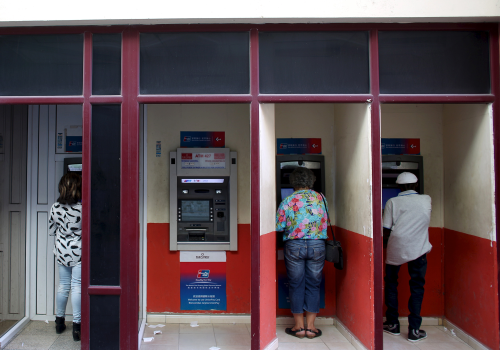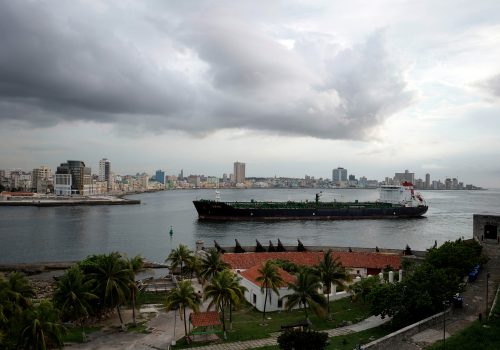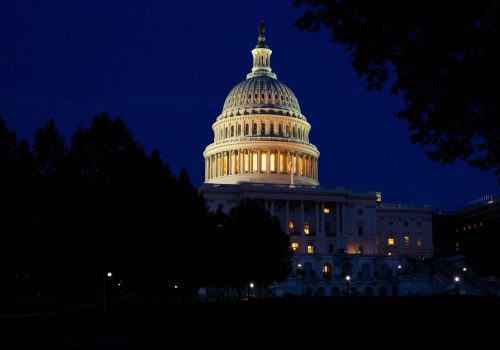The Atlantic Council’s Wazim Mowla Provides Testimony at US House Financial Services Committee Hearing on Caribbean Financial Inclusion
Hearing before the United States House Committee on Financial Affairs
“WHEN BANKS LEAVE: THE IMPACTS OF DE-RISKING ON THE CARIBBEAN AND STRATEGIES FOR ENSURING FINANCIAL ACCESS”
September 14, 2022
Chairwoman Waters, Ranking Member McHenry, and distinguished members of the Committee, it is my privilege to address you this morning on the impacts of de-risking in the Caribbean and strategies for ensuring financial access. Today, my testimony will focus on (1) why correspondent banking relations matters and how de-risking is an impediment to Caribbean economic development; (2) how de-risking affects U.S. national security and why it matters for U.S.-Caribbean relations; and (3) recommendations that can help address de-risking in the short- and long-term. Today’s testimony draws on the recommendations of the Financial Inclusion Task Force, which was convened by the Caribbean Initiative at the Atlantic Council’s Adrienne Arsht Latin America Center.
First, I congratulate the Committee for prioritizing the withdrawal of correspondent banking relations in the Caribbean. It was an honor to accompany Chairwoman Maxine Waters to Barbados in April 2022 to participate in the Financial Access Roundtable that was co-chaired by the Honourable Mia Mottley, Prime Minister of Barbados in which the issue of de-risking was raised. Given the impacts and challenges facing Caribbean economies, governments, and citizens, urgent action is needed to safeguard the future survival and prosperity of the region. In this vein, addressing de-risking is critical. At the same time, ensuring that the Caribbean remains connected to the global financial system via correspondent banking relations has direct and indirect benefits for U.S. interests and its national security.
Financial development and access are cornerstones of economic growth and development. Critically, correspondent banking and cross-border financial flows are essential for countries, financial institutions, individuals, and businesses to transact and effect payments. These payments are necessary for all countries, particularly for international and domestic trade, foreign investment, portfolio management, and other key cross-border transactions, such as remittances. Simply, correspondent banking is the medium used to access international currencies, including the U.S. dollar. Without access to the global financial system, U.S. interests are adversely affected, as it provides an opening for increased financial crimes, illicit flows, the usage of Chinese currencies, and limits U.S. economic influence abroad.
The need to address de-risking in the Caribbean has never been more urgent. The region’s small and open economies are under threat. Over the past decade, natural disasters and extreme weather events have limited the economic potential in the Caribbean. Over the past two years, the COVID-19 pandemic has taken on this role. Russia’s invasion of Ukraine and the resulting consequences, in the form of rising food and energy prices, has the potential to cripple Caribbean economies and disrupt the livelihoods of the region’s citizens. Correspondent banking is at the core of helping Caribbean countries rebuild after each economic shock. It allows for countries to access development finance from multilateral banks to invest in new, resilient infrastructure and is a medium that allows organizations deliver needed aid to citizens in need.
De-risking and its effect on Caribbean economies
While de-risking occurs globally, the Caribbean is disproportionately affected. A 2015 survey by the World Bank found that the Caribbean, due to its small size and limited financial markets appears to be the world’s most severely affected region. In 2017, a survey from the Caribbean Association of Banks noted that up to twenty-one Caribbean countries lost at least one correspondent banking relationship. And in 2019, a Caribbean Financial Action Task Force survey showed that at least sixteen banks from The Bahamas, Belize, Jamaica, and members of the Organization of Eastern Caribbean States lost access as well.
De-risking in the Caribbean varies from country to country. Of the Caribbean Community (CARICOM) countries, Belize (-51%), Saint Vincent and the Grenadines (-45%), Dominica (-42%), and The Bahamas (-41%) fared the worst by sheer numbers of lost correspondent banking relation counterparties. Specifically, in Belize, over the course of one year, three domestic banks lost 90 percent of their correspondent banking relations. For these countries, the cost of doing business increased across the broader economy, especially for sectors – such as the tourism industry – that are reliant on executing U.S. dollar transactions. Further, since U.S. and European banks were primarily responsible for de-risking banks in Belize, domestic banks had to look elsewhere for correspondent banking relations, specifically turning to services in Turkey and Puerto Rico. One consequence is that this incurred longer processing times for transactions with some operators in key economic sectors unable to receive payments for almost four months.
Importantly, de-risking affects three main drivers of economic growth and recovery in the Caribbean – remittances, travel and tourism, and access to the global financial system. Remittance flows to the Caribbean are critical for supplementing incomes of working-class populations and accessing the U.S. dollar. For Jamaica, remittances contribute a fifth of the country’s overall GDP and for other countries, they account for upwards of at least 5 percent. Correspondent banking relations allow remittance companies, such as money transfer operators, to move currency from one financial institution to another. In the case of the Caribbean, it helps convert the U.S. dollar to localized currencies. De-risking affects this sector by increasing the operational costs of sending and receiving remittances. This becomes a deterrent to send remittances to the region and can provide incentives for relatives to use other, informal means of transferring money abroad.
The tourism industry in the Caribbean is also affected by de-risking. According to the Inter-American Development Bank, ten of the top twenty tourism-dependent economies in the world are CARICOM members. The value of the tourism industry cannot be understated, nor can correspondent banking be for the functioning of the sector. Correspondent banking is essential for credit card settlements. The inability to process transactions via credit or debit cards due to lost banking relations or high costs in accessing to the U.S. dollar can deter tourists. It also means that local hoteliers and restaurants that service tourists are less likely to afford to import products purchased abroad, such as food, pillowcases, bedsheets, among others.
Most importantly, de-risking limits the ability of Caribbean governments, financial institutions, and businesses to access the global financial systems in terms of trade, investment, credit, and financial flows. Most of these economies also run large physical-trade deficits because of their dependence on imported goods, fuel, and food. The result is that these companies are net importers of capital, usually in the form of investment, credit, and remittances. Without correspondent banking, many of the transactions needed to secure these goods and services would not be possible. De-risking leads to high costs to sustain these transactions and can have adverse effects on market functioning. Simply, it would limit banking customers from sending and receiving payments or maintaining relations with foreign suppliers. This can lead to decreases in revenue for businesses, ultimately contributing to defaults on baking loans, which, in turn, weakens the domestic banking system.
Addressing de-risking is critical for U.S. national security and interests
While de-risking has severe impacts in the Caribbean, the United States, its national security, and interests are not spared. Because of the region’s proximity to the U.S. shores and as a logistics hub for the movement of people and goods, what affects Caribbean countries often impacts the United States. There are four main areas where de-risking affects U.S. interests: (1) the U.S. government’s ability to regulate monetary transactions; (2) the effectiveness of U.S. economic influence; (3) the role of the Chinese currency; and (4) the long-term potential rise of political instability and crime.
The U.S. dollar as the world’s most used currency is critical to U.S. influence abroad. For Caribbean countries, it is central to the health and functioning of their economies. And the main mechanism for accessing the U.S. dollar, beyond receiving hard cash during tourist arrivals, are through correspondent banking. De-risking curtails this possibility, and with it, U.S. monetary and regulatory agencies’ ability to monitor transaction activity. Therefore, de-risking is counterproductive to addressing concerns of money laundering in the region if organizations, enterprises, and individuals are forced to use alternative currencies or avenues – a process commonly referred to as shadow banking. These networks can hide criminal and terrorist activities, making it more difficult for U.S. investigative agencies to bring them down. This presents a clear national security risk for the United States due to the Caribbean’s proximity to countries that house illicit actors, such as Venezuela and Cuba. Increased shadow banking via de-risking coupled with limited U.S. regulatory capability due to lost access to the U.S. dollar exposes the Caribbean to becoming a future hub for criminal financing.
Over a 20-year period (1999-2019), the U.S. dollar accounted for an estimated 96 percent of all trade in the Americas, making the currency critical to the U.S.-Caribbean economic relationship. Companies that are seeking to shorten supply chains and nearshore to the Caribbean are likely to face barriers if they cannot pay service and product suppliers in the region. For companies looking to invest in emerging industries, such as the oil and gas markets of Guyana, Trinidad and Tobago, and Suriname, correspondent banking will be vital to ensuring that the U.S. private sector is able to compete for and maintain existing contracts. There are also implications for trade relations. Most owners of micro, small, and medium-sized enterprises purchase goods and services from the United States, specifically Florida. As of 2020, the Caribbean accounts for nearly 40 percent of all of Florida’s trade with Latin America and the Caribbean. An inability to export to the Caribbean can decrease the overall trade balance of the U.S.-Caribbean relationship, forcing countries in the region to source products elsewhere.
Continued de-risking and loss of access to the U.S. dollar presents an opportunity for Caribbean governments and financial institutions to seek new or strengthen existing relationships abroad, notably with China. While Caribbean governments and people rely on the U.S. dollar, it is not the only internationalized currency. The euro is an alternative, but Caribbean governments face similar de-risking challenges with banks in the European Union. The result is an opportunity for Chinese RMB and its banks to strengthen ties with the Caribbean. Currently, Chinese RMB is not internationally traded to the extent of the U.S. dollar or the euro, nor are Chinese banks as present as U.S. correspondent banks. Chinese RMB also accounts for just 2 percent of global reserves. However, RMB use is increasing globally. From 2009 to 2016, Chinese CBRs globally grew from sixty-five to 2,246. Despite its limited global influence, the RMB still has the potential to be used in smaller markets t, such as the Caribbean. De-risking from U.S. and European banks can push them in this direction. More banking relations offer China new avenues to engage with partners in developing regions that are currently struggling to attract or maintain CBRs, such as Caribbean countries.
The draw of new banks and RMB usage from China is likely to be attractive for most Caribbean countries and can influence Taiwan’s allies in the region. At present, five of Taiwan’s remaining fourteen allies are CARICOM members (Belize, Haiti, Saint Vincent and the Grenadines, Saint Lucia, and St Kitts and Nevis). Except for Haiti, these countries have each lost more than 30 percent of their correspondent banking counterparties since 2011, meaning lost access to the U.S. dollar and potential economic benefits from the United States. China provides an alternative to its allies in the region and if the severity and frequency of de-risking rises in the region, Taiwan’s allies might look to switch diplomatic recognition. These countries, because of their small size, are pragmatic actors, who make decisions in the best interests of the needs of their citizens and their own objectives. Thus, if de-risking continues to threaten Caribbean economic development in Taiwan’s allies, Chinese assistance can be a plug for the holes left by U.S. banks that have de-risked the region.
Since the availability of correspondent banking relations underpins economic growth, the loss of them can drive people into poverty and unemployment as well as limit governments’ ability to respond to the needs of their citizens. This leads to security risks for the Caribbean and broadly for the United States. First, increased poverty and unemployment incentivizes citizens to engage in criminal activity to replace lost household incomes and sustain their livelihoods. Further, it can be a driver for people to join criminal organizations for similar reasons, thus increasing the power of organized crime relative to the state and its own police forces. Second, since de-risking adds another layer of constraint of the fiscal flexibility of Caribbean governments, social unrest and riots might ensue when leaders cannot immediately respond to citizen needs. The likelihood of this increases with frequent disasters and economic shocks – something that is a regular occurrence in the Caribbean.
Strategies to address de-risking that can strengthen U.S.-Caribbean relations
Never has there been more appetite between the United States and the Caribbean to expand cooperation and strengthen their partnership. This was seen at the Ninth Summit of the Americas, where the United States announced the U.S.-Caribbean Partnership to Address the Climate Crisis 2030, otherwise known as PACC 2030. Further, Vice President Harris, on several occasions, and President Joe Biden at the Summit, has carved out time to meet with Caribbean leaders and listen to their perspectives and viewpoints on matters of shared interests, such as food and energy security and access to development finance. In fact, the Congressional Delegation led by Chairwoman Waters to Barbados in April of this year and this hearing to address de-risking in the Caribbean are added indications that U.S.-Caribbean relations are headed in the right direction.
It is important now to take these words and turn them into legislative action. Addressing de-risking can be a first, tangible step as correspondent banking is the lifeblood of economic activity in the Caribbean. In many ways, it is one of the most important avenues of U.S.-Caribbean relations, enabling U.S. government agencies to provide disaster assistance after natural disasters, allowing the U.S. private sector to invest in the region, and ensuring the trade relations with Caribbean countries remain strong.
Earlier this year, the Caribbean Initiative at the Atlantic Council’s Adrienne Arsht Latin America Center released a report, “Financial De-risking in the Caribbean: U.S. Implications and What Needs to be Done,” of which the foreword was written by Chairwoman Waters. The report was a result of an almost year-long process, where the Initiative’s Financial Inclusion Task Force – a group made up of bankers, regulators, and multilateral representatives from across the United States and the Caribbean – met to provide recommendations on how U.S. policymakers can best curb de-risking.
Based on the findings of the report, there are several actions U.S. legislators can take to support Caribbean economic development and protect U.S. interests by addressing de-risking. Since correspondent banking is integral to a functional and healthy global economy, this Committee should consider putting forward legislation that categorizes it as critical market infrastructure or a public good. Through the U.S. Congress, this determination would provide justification for the U.S. Government and international financial institutions to incorporate access to correspondent banking as part of aid and development packages.
Key to the process of addressing de-risking in the Caribbean is ensuring that the affected actors are part of the overall discussion. Caribbean financial institutions and governments have first-hand accounts of the unique challenges they face to address the causes of de-risking and are therefore in the best position to provide feedback on which strategies are most effective. This Committee should consider, through legislation, working with the U.S. Treasury to consult with affected Caribbean actors when developing solutions that lead to greater financial access for the region.
Working hand-in-hand with the Caribbean financial institutions and governments also means providing them with a platform that shows progress these actors have made to fulfill compliance and regulatory requirements. As such, the Committee should consider adopting and passing “The INCSR Improvement Act,” which will help Caribbean financial actors and government leaders annually underscore actions taken to address money laundering, drug trafficking, and financial crimes. The passage of the Act will help promote healthy dialogue between U.S. and Caribbean actors.
Dialogue is critical to addressing de-risking. Therefore, the Atlantic Council is working alongside and in coordination with several key partners to create an annual U.S.-Caribbean Banking Forum. The intent for the Forum’s creation stems from the Atlantic Council’s report on financial de-risking and was supported by Caribbean government leaders and U.S. legislators during the April 2022 Financial Access Roundtable in Barbados. Since then, an organizing committee that comprises bankers, multilateral representatives from across the Americas, and the Atlantic Council has been formed to carry out the inaugural Forum and will look to include the recommendations and feedback from this hearing into its eventual agenda.
In sum, the health and future of U.S.-Caribbean relations may well depend on correspondent banking relations remaining present in the region. Caribbean countries face an uphill battle to address de-risking. Even some of their solutions to note such as launching a Central Bank Digital Currency (CBDC) to address de-risking comes with its challenges. An Atlantic Council tracker on CBDCs notes that cybersecurity is an increasing concern as well as the ability of countries to house these currencies where there is instability in the financial system – two areas where Caribbean countries are still in need of support.
Decisive action is needed for U.S. interests and national security, yes, but also for the prosperity and livelihoods of the average U.S. and Caribbean citizen. Thank you, once again, for the honor and the opportunity to appear before the Committee today. I look forward to answering your questions.
“Addressing de-risking can be a first, tangible step as correspondent banking is the lifeblood of economic activity in the Caribbean. In many ways, it is one of the most important avenues of U.S.-Caribbean relations, enabling U.S. government agencies to provide disaster assistance after natural disasters, allowing the U.S. private sector to invest in the region, and ensuring the trade relations with Caribbean countries remain strong.”
Related content

The Adrienne Arsht Latin America Center broadens understanding of regional transformations and delivers constructive, results-oriented solutions to inform how the public and private sectors can advance hemispheric prosperity.



